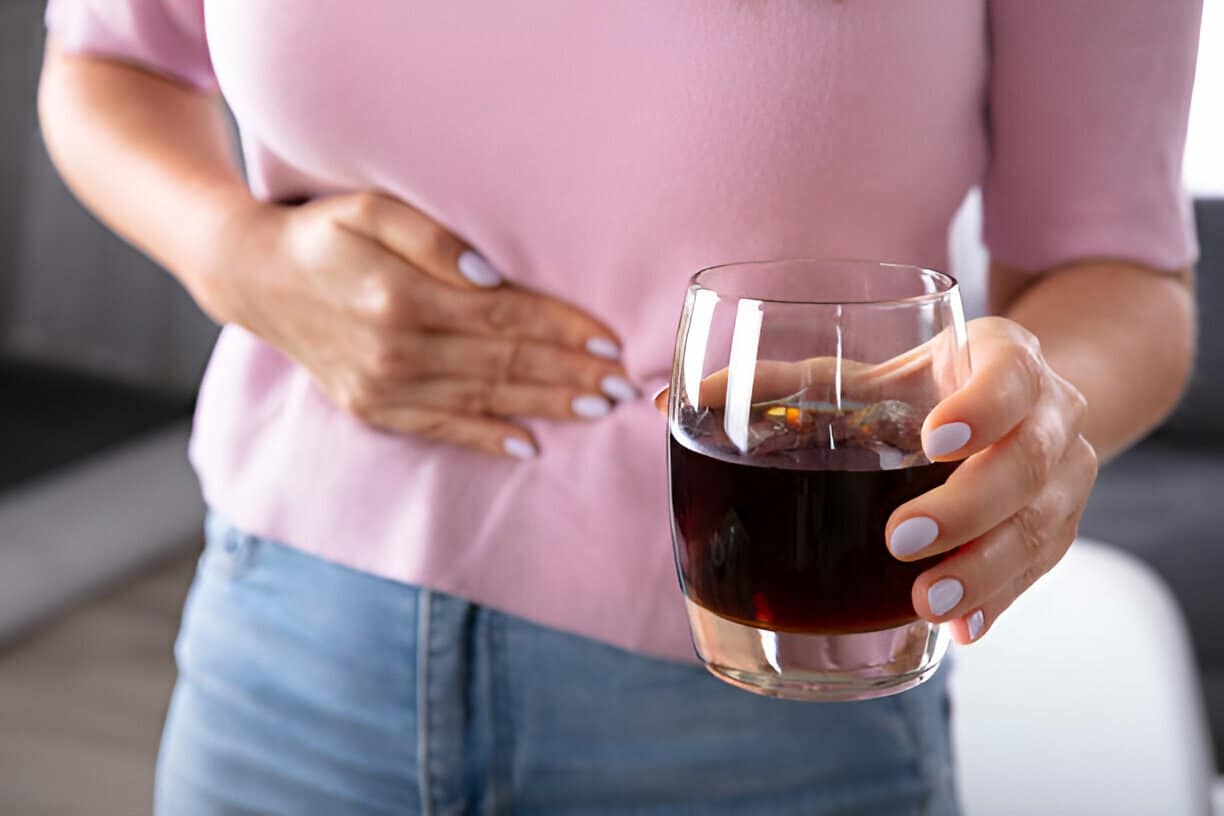Pain After Booze : Why Does My Stomach Hurt After Drinking?

Ever felt that gnawing ache or burning sensation in your gut after a night of drinks? You’re not alone. Stomach pain after drinking is a common complaint, and there are a few reasons why it might happen. Let’s delve into the science behind the discomfort and explore ways to soothe your stomach.
The Irritating Truth: Alcohol and Your Stomach Lining
The culprit behind most post-booze bellyaches is the very drink itself: alcohol. Alcohol acts as an irritant to your stomach lining. Imagine your stomach lining as a smooth, protective layer. When you drink alcohol, it disrupts this barrier, causing inflammation. This is similar to what happens when you eat spicy food or take certain medications – your stomach gets upset.
In medical terms, this irritation is called gastritis. Gastritis can cause a range of unpleasant symptoms, including:
- A dull or burning ache in your upper abdomen
- Nausea and vomiting
- Indigestion (feeling uncomfortably full or bloated)
- Loss of appetite
The severity of these symptoms depends on various factors, such as the amount of alcohol you consumed, the presence of food in your stomach, and your overall health.
Beyond Gastritis: Other Culprits for Stomach Pain
While gastritis is the most common reason for stomach pain after drinking, there are other possibilities to consider:
- Dehydration: Alcohol is a diuretic, meaning it increases urination and can lead to dehydration. Dehydration itself can cause stomach discomfort.
- Food choices: Greasy, spicy, or acidic foods can irritate your stomach, and the combination with alcohol can worsen the effect.
- Medication interactions: Some medications don’t interact well with alcohol and can cause stomach upset.
If you take regular medication, consult your doctor about potential interactions with alcohol.
Soothing Your Stomach After the Party
If you’re experiencing stomach pain after drinking, here are some steps to help ease the discomfort:
- Hydration is key: Drink plenty of water to rehydrate and flush out toxins. Opt for calming drinks like ginger tea or chamomile tea.
- Bland diet: Stick to easily digestible foods like toast, crackers, or plain rice. These foods put less strain on your digestive system.
- Over-the-counter relief: Medications like antacids can help neutralise stomach acid and relieve heartburn or indigestion.
Important Note: If your stomach pain is severe, persistent, or accompanied by other concerning symptoms like vomiting blood, black stools, or fever, seek immediate medical attention.
Preventing the Pain: Drinking Smart
The best way to avoid stomach pain after drinking is to be mindful of your alcohol consumption. Here are some tips:
- Pace yourself: Sip your drinks slowly and savour the flavour. Aim for at least one non-alcoholic drink between alcoholic beverages.
- Eat before and during drinking: Food helps to slow down the absorption of alcohol and protect your stomach lining.
- Choose your drinks wisely: Opt for drinks lower in alcohol content and limit sugary cocktails.
- Know your limits: Listen to your body and stop drinking when you feel tipsy.
Remember, moderation is key!
By understanding the reasons behind stomach pain after drinking and following these tips, you can enjoy a night out without the unpleasant after-effects.
Disclaimer: This blog post provides general information only and is not a substitute for professional medical advice. Always consult your doctor if you experience concerning symptoms or have questions about your health.
Beyond the Basics: A Deeper Dive into Stomach Pain and Alcohol
While we’ve covered the common reasons for stomach pain after drinking, let’s explore some lesser-known factors and delve a bit deeper into the science:
Acid Reflux and Ulcers: Alcohol can weaken the lower esophageal sphincter (LES), a muscular valve that prevents stomach acid from flowing back up into the oesophagus. This can lead to acid reflux, causing heartburn and a burning chest sensation. In severe cases, it can contribute to ulcers, which are painful sores in the stomach lining.
Inflammation and Gut Microbiome: Beyond the immediate irritation, alcohol disrupts the delicate balance of the gut microbiome, the community of bacteria living in your digestive system. This disruption can trigger inflammation throughout the digestive tract, contributing to stomach pain and other digestive issues.
Long-Term Effects: Heavy alcohol consumption over time can lead to chronic gastritis, a long-term inflammation of the stomach lining. This can cause persistent stomach pain, nausea, and difficulty digesting food. In rare cases, excessive alcohol consumption can even increase the risk of stomach cancer.
Understanding Individual Differences
It’s important to remember that everyone reacts differently to alcohol. Some people may experience severe stomach pain even after a moderate amount, while others might not feel any discomfort. This can depend on several factors:
- Genetics: Some people have a genetic predisposition for gastritis or ulcers, making them more susceptible to alcohol-induced stomach pain.
- Underlying health conditions: Certain medical conditions, such as irritable bowel syndrome (IBS), can worsen with alcohol consumption and lead to stomach pain.
- Food intolerances: If you have a food intolerance, like lactose intolerance, consuming those foods alongside alcohol can exacerbate stomach issues.
If you experience persistent stomach pain after drinking, even with moderate consumption, it’s crucial to consult your doctor to rule out any underlying conditions.
Taking Care of Your Gut: A Holistic Approach
Here are some additional tips to promote gut health and minimise the risk of stomach pain after drinking:
- Prioritise gut health: Eat a balanced diet rich in fruits, vegetables, and whole grains. These foods nourish the good bacteria in your gut. Consider incorporating probiotics, either through fermented foods like yoghurt or kefir or in supplement form, to further support your gut microbiome.
- Manage stress: Chronic stress can negatively impact digestion. Practice relaxation techniques like yoga or meditation to manage stress levels.
- Get enough sleep: Adequate sleep is essential for overall health, including gut health. Aim for 7-8 hours of quality sleep each night.
By adopting these healthy habits, you can build resilience in your digestive system and minimise the chances of stomach pain after enjoying a drink occasionally. Remember: Responsible drinking and a focus on gut health are key to a happier stomach and a healthier you!
When to Seek Medical Help
While most stomach pain after drinking is temporary and can be managed with home remedies, there are situations where seeking medical advice becomes crucial. Here are some red flags to watch out for:
- Severe or persistent pain: If the pain is excruciating or doesn’t subside within a few days, it’s best to see a doctor.
- Vomiting blood or black stools: These can be signs of internal bleeding, a serious medical condition.
- Fever or chills: These symptoms, along with stomach pain, could indicate an infection.
- Difficulty swallowing: This can be a sign of esophageal damage from severe acid reflux.
- Unexplained weight loss: This, along with stomach pain, could be a symptom of a more serious condition like stomach cancer.
If you experience any of these symptoms, don’t hesitate to seek immediate medical attention. Early diagnosis and treatment can make a big difference in your recovery.
Should you care if it happens so often ?
- Chronic gastritis risk: Frequent irritation from alcohol can lead to chronic gastritis, a long-term inflammation of the stomach lining. This can cause persistent discomfort, hinder digestion, and increase the risk of ulcers.
- Gut microbiome disruption: Repeated alcohol exposure disrupts the gut microbiome, impacting its ability to function properly. This can trigger inflammation throughout the digestive system and contribute to various digestive issues.
- Underlying conditions: Frequent stomach pain after moderate drinking could indicate an underlying medical condition like ulcers, IBS, or food intolerances. Addressing these conditions is crucial for gut health and overall well-being.
- Increased health risks: Heavy alcohol consumption over a long period can elevate the risk of stomach cancer. While occasional pain might not be a direct sign, it’s a good prompt to re-evaluate your drinking habits.
Here’s what to do if it happens often:
- See a doctor: Consulting a doctor is vital. They can help identify any underlying conditions and recommend appropriate treatment.
- Reduce alcohol intake: Consider cutting back on alcohol consumption or eliminating it altogether, especially if the pain is severe.
- Focus on gut health: Prioritise a balanced diet rich in gut-friendly foods and consider probiotics to support your gut microbiome.
Remember, ignoring frequent stomach pain can lead to more serious health problems down the line. Taking action and prioritising your gut health is key to preventing future discomfort and maintaining overall well-being.
Conclusion: Knowledge is Power
Understanding the link between alcohol and stomach pain empowers you to make informed choices about your drinking habits. By adopting a moderate approach to alcohol consumption, prioritising gut health, and being mindful of potential risks, you can minimise the chances of post-drinking discomfort and maintain a healthy digestive system.
Remember: A balanced lifestyle with a focus on moderation and gut health is the recipe for a happy stomach and a healthy you!




